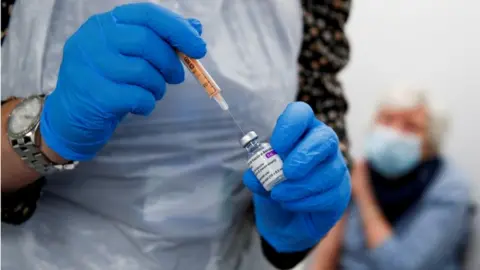Covid-19: 'No change' to Irish vaccine priority after age reports
 Reuters
ReutersThere is no change to Ireland's policy on vaccine priority, a government spokesperson has said, after reports officials were considering vaccinating younger people ahead of others.
The Department of Health confirmed that the country's health minister had asked for an assessment of such a move.
The department said it was to see what impact the change would have on the transmission of the virus.
The plan could see those aged 18-30 being vaccinated after the over 60s.
The Irish Times reported that Stephen Donnelly, the health minister, had asked officials to look at the vaccine order of priority.
However, Irish broadcaster RTÉ reports that a government spokesperson said there was no change to the country's vaccine policy.
The head of the Republic of Ireland's health service also said he is not aware of a proposal.
The chief executive of the Health Service Executive (HSE), Paul Reid, said his organisation is focused on the government's plan targeting older cohorts and medically vulnerable groups.
Earlier this month, changes were made in the Republic to the vaccine roll-out to make it a system primarily based on age, following medical advice.
Vaccination rollout
From Saturday, the HSE facility for booking Covid-19 vaccination appointments opened to 67 year olds.
In Northern Ireland, people aged 44 to 40 have been able to book their vaccination since 8 April.
Northern Ireland is ahead of the Republic of Ireland in terms of the proportion of the population vaccinated.
The latest figures, up until 15 April, show that 850,103 people in Northern Ireland have had a first dose of a vaccine.
This is around 45% of Northern Ireland's overall population, and almost 60% of the adult population.
In the Republic of Ireland, about 22% of the eligible population have had a first dose.
As of 15 April, about more than 1.1 million doses have been given out, with 814,470 first doses, and 341,129 second doses.
